As the cost of traditional funerals continues to rise, many Virginians are turning to cremation as a more affordable and flexible alternative. Several different cremation options are available to families, and deciding what type of cremation service is required is important. Read on to learn more about cremation costs in Virginia in 2024.
Listed below is a breakdown of average & best direct cremation prices by area in Virginia.
| CITY | BEST PRICE (DFS Memorials) | AVERAGE PRICE (Parting) | CALL NOW - DFS |
|---|---|---|---|
| Alexandria | $1,345 | $2,484 | (703) 997-9323 |
| Chesapeake | $1,650 | $2,563 | (757) 304-6533 |
| Hampton | $1,650 | $2,320 | (757) 304-6533 |
| Harrisonburg | $1,650 | $2,805 | (540) 205-6902 |
| Lynchburg | $1,650 | $3,298 | (540) 205-6902 |
| Manassas | $1,345 | $2,170 | (703) 997-9323 |
| Newport News | $1,650 | $2,189 | (757) 304-6533 |
| Norfolk | $1,650 | $3,139 | (757) 304-6533 |
| Portsmouth | $1,650 | $2,373 | (757) 304-6533 |
| Roanoke | $1,650 | $2,004 | (540) 205-6902 |
| Richmond | $1,650 | $2,509 | (757) 304-6533 |
| Suffolk | $1,650 | $2,141 | (757) 304-6533 |
| Virginia Beach | $1,650 | $3,279 | (757) 304-6533 |
Low-cost direct cremation prices above are offered by DFS Memorials – a network of affordable cremation service providers. Visit DFS Memorials – Virginia to check other locations and prices.
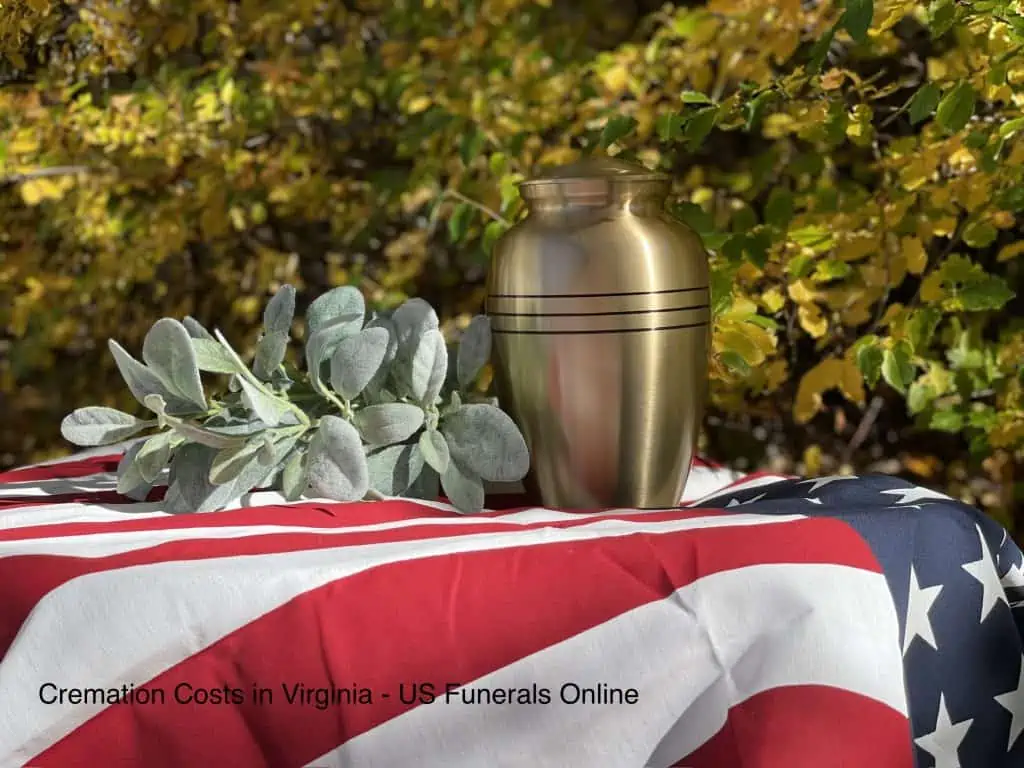
The most economical service is known as a “direct cremation,” where the deceased is taken into the care of a funeral home/cremation provider, all the necessary legal paperwork is completed, and the body is then cremated. There is generally no viewing or service with a direct cremation.
What are the different types of cremation service options and costs?
There are 3 main types of cremation choices available to families in Virginia, and we have outlined the differences below.
1. Direct Cremation – a direct cremation involves the immediate cremation of the deceased without a formal funeral service being held. This basic type of cremation service has become popular due to its simplicity and cost-effectiveness. In Virginia, the average cost for a direct cremation in 2024 is just under $2,484*. However, it is crucial to note that prices can vary significantly depending on the location. Typically the price for a direct cremation is less in cities generally than in rural areas.
This discrepancy can be attributed to factors such as increased competition, higher population density, and greater availability of cremation facilities.
Overall, cremation services costs are somewhat higher in Virginia than in many other states. With $1,345 being the lowest cost for a direct cremation service.

2. Cremation Memorial Service – a cremation memorial typically refers to the cremation before a memorial service is held. The memorial service can be held at the funeral home, chapel, church, place of worship, or at any chosen location. Some families today choose to hold memorial services at community venues. The memorial service will usually be held with the cremation urn present as a focal tribute to the deceased. However, memorial services are also held without the cremated remains present.
It is not as simple to give an overview of cremation memorial services’ costs, as the ‘variable’ of the memorial service will dictate the final cost. Much will depend on whether the funeral home and other ancillary services are added to conduct the memorial service. Such as the type of cremation urn selected, flowers, photographs, and other tribute materials.
As a guide, a Cremation Memorial Service in Virginia can cost between $3,400 – $6,000.
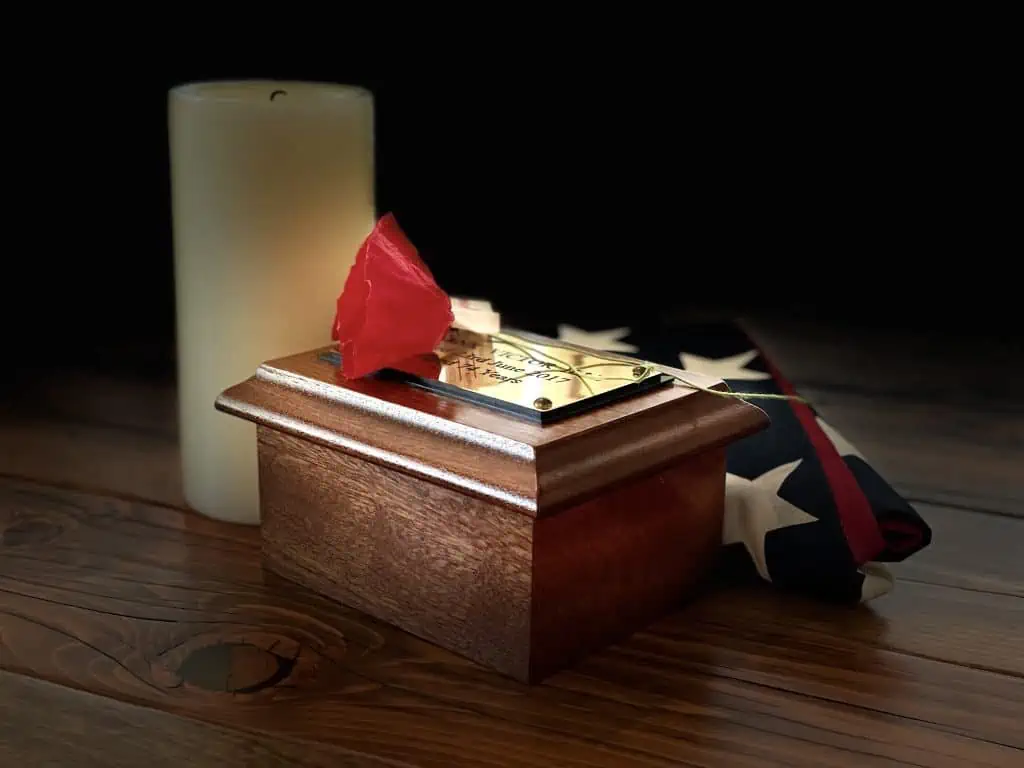
3. Full-Service Cremation Funeral – This type of service is a full-service funeral, with the cremation conducted after the funeral service. Some families want to hold a visitation, wake, or formal funeral ceremony, even if they choose cremation. A viewing, visitation, or vigil can be held at the funeral home. Family and friends can gather for a funeral service, typically with the deceased present. Following the funeral ritual, the deceased is transferred to the crematory for cremation, and the cremation ashes are then returned to the family.
This type of cremation service is like a traditional funeral service, except the deceased is cremated after the ceremony and services instead of transferred to the cemetery for burial.
This option enables a family to have all the traditional funeral rituals without the additional expense of cemetery plot costs. Or a family may have a cemetery plot where they wish to inter the cremated remains.
As a guide, a Full Service Cremation Funeral in Virginia can cost between $5,000 – $12,000
Understanding average cremation costs in Virginia today?

As discussed, cremation service costs vary depending on the type of cremation service and the cremation service provider. So, quoting “average” costs can be difficult. One funeral home can charge $1,345 for a direct cremation, yet another will charge $3,900 for a direct cremation. They are both offering the exact same service. Meaning the higher end of the pricing spectrum can skew an “average” price for a direct cremation.
Summary – Cremation Options & Costs
- Cremation services have gained popularity as cremation offers a much more affordable death care alternative. Whether the cost is the driving factor or for those families and individuals who want a simple, flexible, and more creative option.
- Direct cremation offers families an extremely cost-effective option to manage an immediate death or preplan for a simple cremation.
- Choosing cremation means that a family can personalize memorialization. There are many options for conducting a memorial service and creating memorial artifacts from cremated remains.
Direct cremation
Pros:
- Offers the most economical cremation option.
- Can eliminate many ancillary funeral expenses.
- Can be arranged without the need to visit the funeral home for arrangement.
- It is easy to make arrangements from out-of-state & have cremated remains shipped to the family for a memorial service elsewhere.
- Allows for the disposition of a body to be handled in a quick yet dignified manner. And enable the family to postpone a funeral memorial service until later.
Cons:
- May require the family to submit online forms with the information required to process the cremation. This often helps a direct cremation provider collate data and manage staff arrangement time/costs.
- The cremated remains are usually returned in a temporary cardboard container unless you choose to add a cremation urn to your direct cremation service package.
Cremation Memorial Service
Pros:
- A family can still gather for a ceremony, but as the cremation is conducted first, the time frame for holding a memorial service is more flexible.
- Memorial services can be uniquely personalized, allowing the family to be creative in the design of a service.
- Offers a more affordable funeral celebration/ritual event.
Cons:
- As Memorial services, or a Life Celebration Memorial, can get quite creative, the ancillary costs for the memorialization can easily escalate.
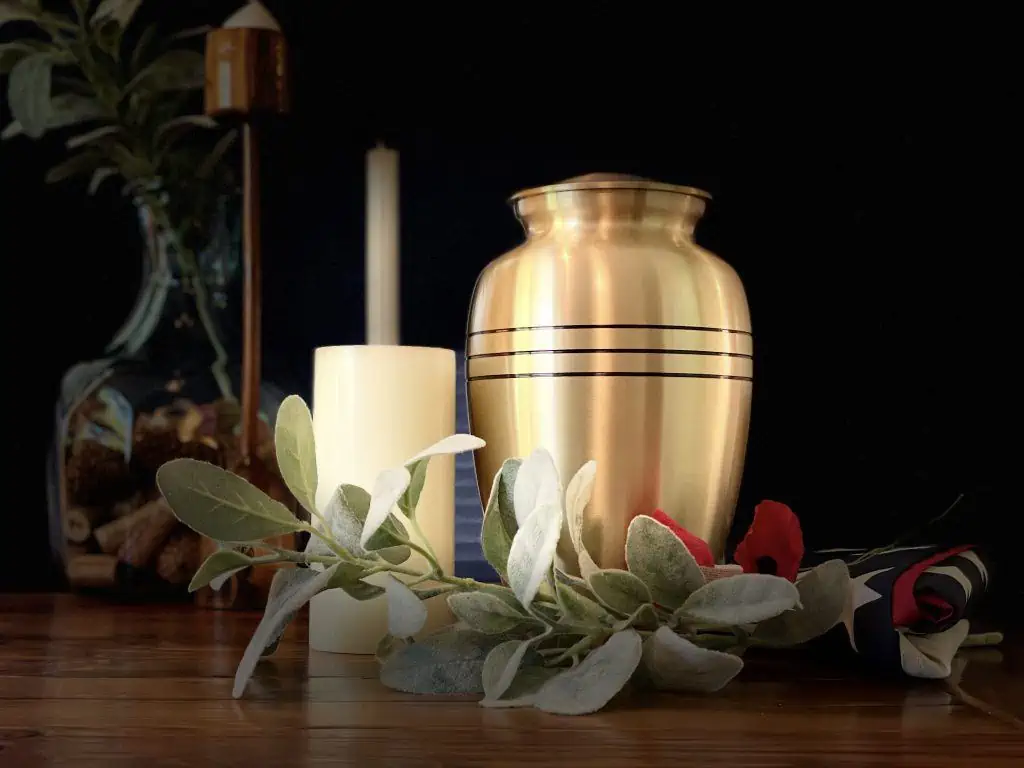
Traditional Cremation Service
Pros:
- A funeral service is held at the time of passing and can help families to say goodbye.
- It will cost less than a traditional burial service.
- More funeral homes offer rental caskets for a cremation service to help reduce casket expenses.
Cons:
- As you are conducting a traditional service with the help of a funeral director, it can be easy to find that ancillary expenses can add up.
- A traditional cremation service is generally held fairly soon after the deceased passes. A direct cremation or cremation memorial can enable the family to defer the need for immediate services.
What Can You Do with the Cremation Ashes?
After a cremation service, a family has several options for what to do with the cremation ashes. This may depend on their preferences and beliefs. Or the costs associated with cremation memorialization choices.
Listed below are the main options for you to consider:
1. Keep the ashes at home: Many families choose to keep the ashes in an urn or a special container at home. This allows them to create a comforting presence and keep their loved ones nearby. Some families even choose to display the ashes in a special area or create a memorial space.
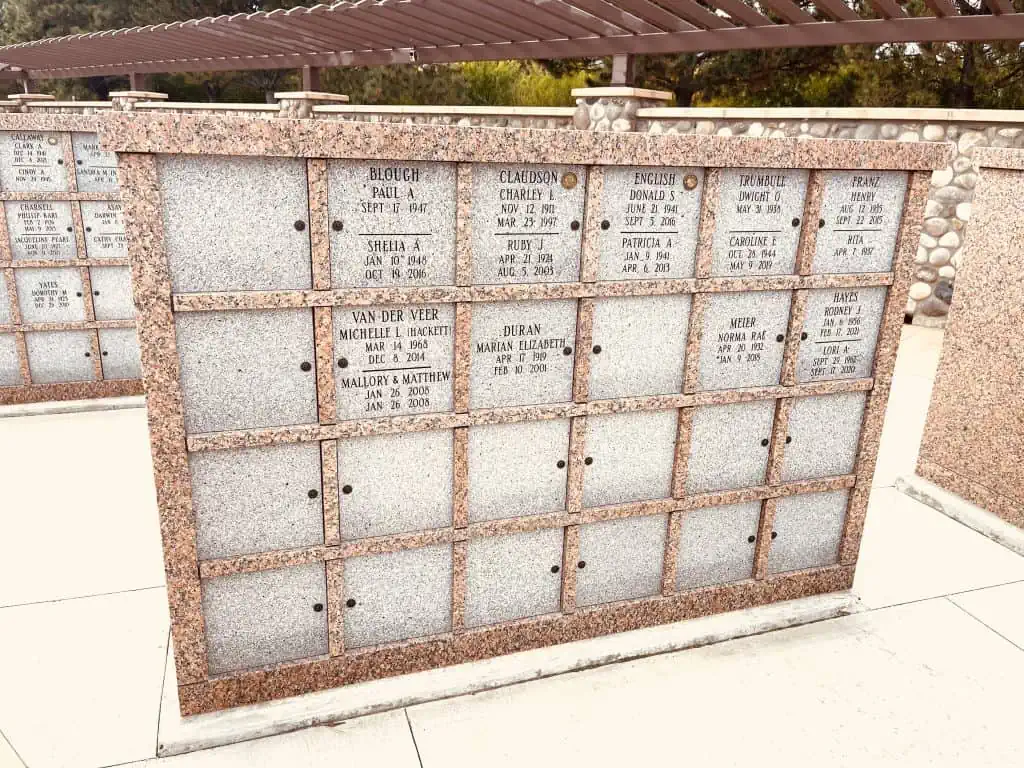
2. Bury the ashes: Families can choose to bury the ashes in a cemetery or a designated burial plot. This provides a more permanent resting place and allows for future visits and remembrance. Aside from cemetery burial plots, more cemeteries now offer dedicated cremation columbarium niches and bespoke memorial scattering gardens. Some gardens offer small plaques or benches to create a long-lasting tribute.
3. Scatter the ashes: Scattering the ashes can be a meaningful way to honor the deceased’s memory. Ash scattering is now a popular choice for many families. Scattering cremation ashes can hold great symbolism for many people. It represents releasing and returning a loved one’s physical remains to the elements, freeing their spirit. The act of scattering ashes can symbolize letting go, saying goodbye, and allowing the deceased to become part of the natural world.
These are just a few suggestions, and it ultimately depends on the family’s wishes and cultural or religious practices. It may be helpful to consult a funeral director who can provide guidance and support to help you decide.
Remember that there is no timeframe for when or how to memorialize a loved one. So, if you are unsure, do not make a rushed decision.
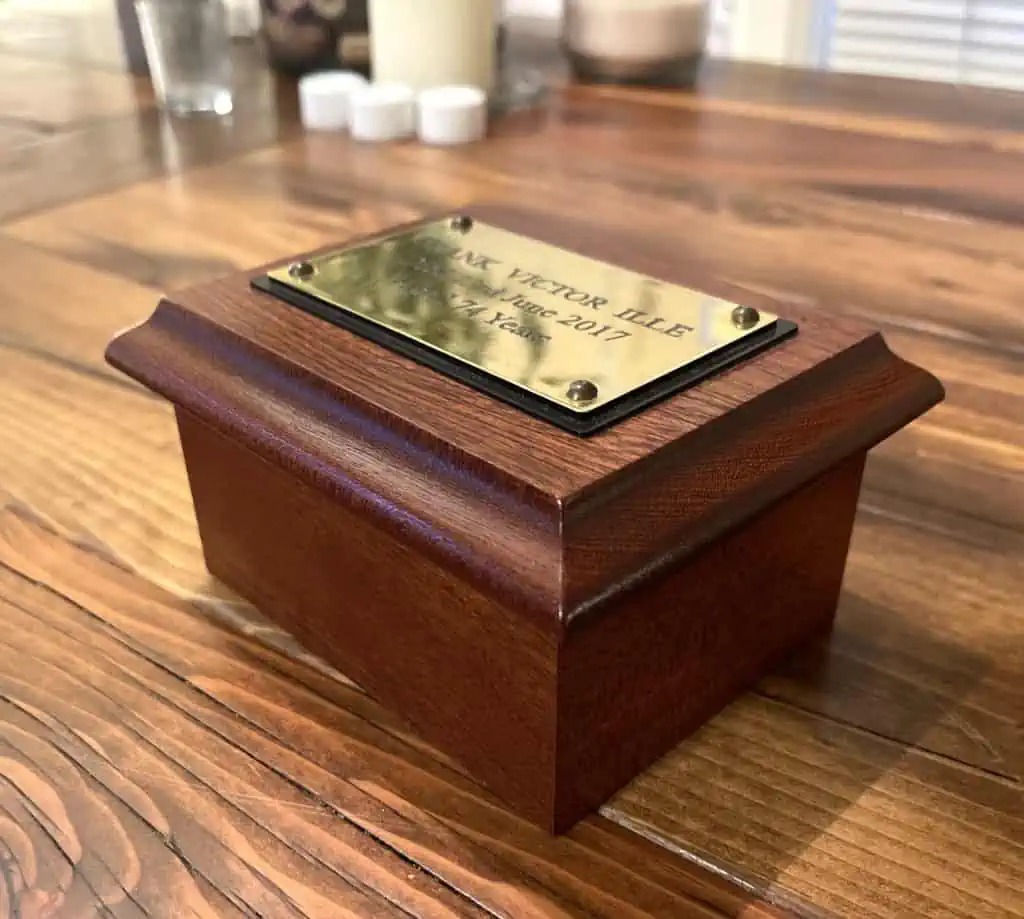
What Virginia Legislation Governs Cremation Arrangements?
In Virginia, the laws governing cremations are primarily outlined by the Virginia Board of Funeral Directors & Embalmers. The regulations and requirements for the operation of crematories and the cremation process are clearly defined to ensure it is conducted safely and legally.
The main key points of the legislation are:
Authorization: In Virginia, the Chief Medical Examiner must sign off on the permit to cremate. As required by code § 32.1-309.3. Before a cremation can occur, the person with the legal authority to make decisions regarding the deceased’s remains must provide written authorization. This is generally referred to as the Cremation and Disposition Authorization Form.
Identification: In Virginia, the next of kin (or a representative) must give a visual ID of the deceased. Either an actual attended identification or a photograph, and this must accompany the Cremation and Disposition Authorization Form.
Documentation: Detailed records must be maintained throughout the entire cremation process, including information about the identity of the deceased, the date and time of the cremation, and any medical devices or implants present.
Crematory requirements: Every crematory operated in Virginia must have a manager who has a crematory operator certification. This accreditation must be a recognized certification from the Cremation Association of North America (CANA), the International Cemetery, Cremation and Funeral Association (ICCFA), or another association approved by the Virginia State Board and in compliance with Occupational Health and Safety Administration standards.
Disposition of remains: After the cremation, the cremains must be properly handled in accordance with the wishes of the deceased or their authorized representative. If, after 120 days from the date of cremation, the family or nominated agent has not claimed the cremains or instructed the funeral director as to a final disposition, a funeral director may dispose of the cremains of the deceased. This can be by interment, entombment, inurnment, or by scattering of the cremains, The funeral director must keep a permanent record of all cremains and identify the method and site of the final disposition.
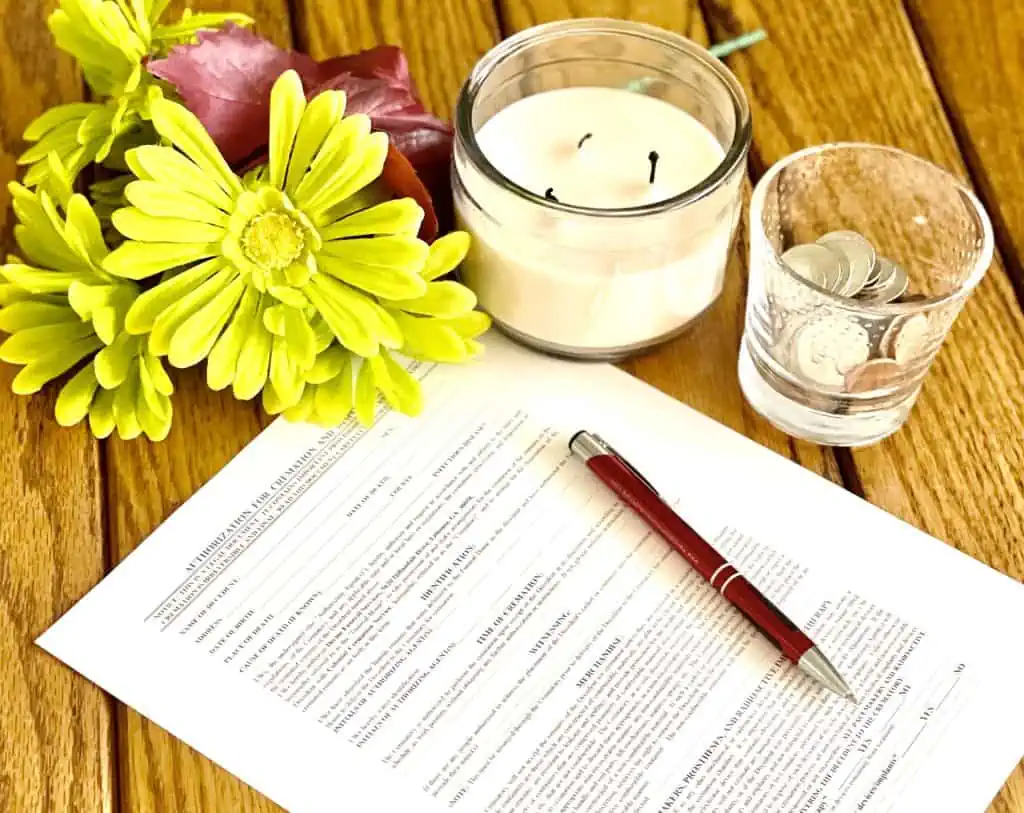
Cremation Container: A casket is NOT required by law for a cremation. All that is required is a suitable rigid container. A cremation container is usually a reinforced cardboard or plywood box. Some funeral homes offer rental caskets if you wish to hold a funeral service before the cremation.
These are the key aspects of the laws regarding cremation in Virginia. For more specific information or if you have any additional questions, it would be a good idea to consult an attorney or contact the Virginia Board of Funeral Directors and Embalmers for official guidance.
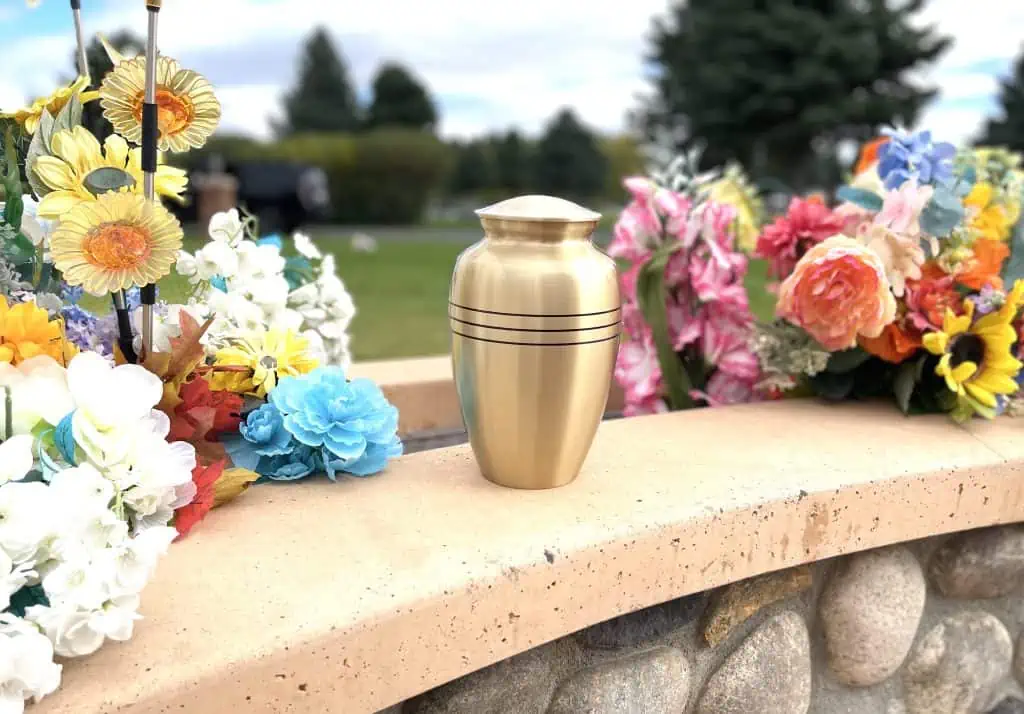
Do you have to employ a funeral director for a direct cremation? Can the family deal directly with the crematory?
No, you do not have to employ a funeral director in Virginia. You can make arrangements to deal directly with a crematory. You would need to file for the death certificate within three days after the death. A death certificate can be filed with your local County registrar. You can then arrange to transport the deceased to the crematory for the cremation. No official laws require a transit permit if you wish to transport the deceased within the state to a crematory.
How long does a cremation take in Virginia?
There is no mandatory wait period after the death before a cremation can go ahead in Virginia. However, the process to complete the legally required paperwork usually takes at least 24 hours. It is fair to say that it is usually 5-7 days for a cremation to be performed. (Longer if there are any issues with consent or issuing a death certificate)
The deceased will be sheltered in refrigerated storage during this time. A direct cremation service package generally includes refrigeration for up to 10-14 days. There may be an additional daily fee for refrigeration if the funeral home has to store the deceased for longer.
What is the least expensive cremation service?
Direct cremation is your least expensive cremation option. This is when cremation is carried out without a service or ceremony. It is a simple, dignified cremation of the deceased with minimal ‘fuss’ and at a minimal cost.
The cremated remains are returned to the next of kin after everything has been taken care of. A family can hold a memorial service if they wish when they are ready, which can even be conducted at home for much less.
Direct cremation takes care of the immediate need to handle the disposition of the deceased. Still, it can also enable the family to defer the need for a memorial service or enable them to craft their own bespoke personalized ‘send off.’
Are there any extra fees added to a low-cost cremation service package?

The service charge for a direct cremation is listed on the funeral provider’s General Price List. This should include the basic services of the funeral director, collection and transfer of the deceased, completing the legal paperwork, and conducting the cremation. It usually includes a simple cardboard cremation container and a temporary urn.
The funeral director will pay third-party fees to the local county to obtain the death certificate and pay for any permit charges. These are third-party fees that are added to the direct cremation service fee.
The fee for a death certificate is $12.00 in Virginia. You may require more than one death certificate, as you must simultaneously send them off to multiple institutions, organizations, or government offices.
Most authority bodies that need evidence of the death, i.e., a life insurance company, will require an original copy of a death certificate. Certified copies of a death certificate are usually available within ten days after the death.
There can be an additional charge if any of the below services are required:
- Residential collection
- Removal of a pace-maker
- Overweight surcharge (above 250 pounds)
- Family arrangement consultation
- Mailing of cremated remains
What about a “no-cost” cremation in Virginia?

What is sometimes called a “free” cremation or “no-cost” cremation is a whole-body donation. Once the donation is performed, the remains are cremated free of charge. However, in some cases, there are costs associated with transporting the deceased and obtaining death certificates.
Donating your body to medical science has been an end-of-life choice for some time now. However, it has certainly gained more popularity in recent times. For many, it now seems a valuable disposition method, so it is commonly called an “anatomical gift.”
Several national organizations offer an anatomical gift program whereby you can donate your body to science and the benefit of future generations. They arrange the collection of the deceased, medical donation, cremation of remains, and return of cremains to the family, usually at no charge.
The Virginia State Anatomical Program is operated by the Virginia Department of Health. It is the only organization in the Commonwealth legally authorized to accept, document, and distribute whole donated bodies. You can contact them to register for anatomical donation.
Do understand that an anatomical donation cannot always be accepted at the time of death. It can be affected by the needs of medical and research institutions at the time and transportation services. It is always prudent to have a reserve plan for a direct cremation in place.
Visit our Body Donation page to read further about this option.

Is there any financial assistance towards cremation costs in Virginia?
Overall, financial help towards cremation costs is rather limited, and these days budgets are even further stretched with the state of the economy. However, we have detailed below a few resources that may help.
Federal Resources: Social Security may pay a $255 lump-sum death benefit if qualifying, and certain veteran’s benefits are available.
State Resources: The state of Virginia offers assistance with cremation costs for those who are enrolled in its Temporary Assistance for Needy Families (TANF) or Supplemental Nutrition Assistance Program (SNAP). Application is made through the county of residence, with payment made directly to the funeral home.
County/Municipality Resources: What is available to assist with cremation expenses from the County or Municipality may vary by budget and eligibility. You can check with your local County on the Virginia Department of Social Services.
The Virginia Military Funeral Honors for Unclaimed Veterans’ Cremains Program works with funeral homes to honor those who served and whose remains may remain unclaimed. Funeral homes participate by contacting the Virginia Department of Veterans Services. The department then ensures that any veteran’s cremated remains are respectfully found a final resting place at a Veterans Cemetery in Virginia.
What happens if I cannot pay for a cremation?
As covered above, there are Federal, State, and County programs the family can explore if the deceased and surviving family are eligible. The responsibility to pay the funeral bill falls to the immediate next of kin if the deceased had no pre-paid funeral plan or life insurance. This can be very stressful if you lose a family member and become responsible for the funeral arrangements without any resources.
Check out this guide to What to do if I cannot afford a funeral to learn about other possible funding and charity organizations.
What happens if the deceased is at the Medical Examiner’s?
If the deceased is at the coroner’s office, you must arrange for a funeral director to collect the body when the coroner signs the release form. You must authorize the funeral director to collect your loved one and transfer him or her into their care.
As most funeral directors deal with the Office of the Chief Medical Examiner (OCME) on a regular basis, and the ME issues the authorization and permit to cremate, it can make the arrangements easier. For this reason, some funeral homes can offer a budget direct cremation when handling remains from the Medical Examiner.
There are some 160 Medical Examiners serving in Virginia and four main OCME divisions:
Central District
400 East Jackson Street, Richmond, VA, 23219 Phone (804) 786-3174
Northern District
10850 Pyramid Place, Ste. 121, Manassas, VA, 20110 Phone (703) 530-2600
Tidewater District
830 Southampton Ave., Ste. 100, Norfolk, VA, 23510 Phone (757) 683-8366
Western District
6600 Northside High School Road, Roanoke, VA, 24019 Phone (540) 561-6615
How to Make a Complaint if you are dissatisfied with a Cremation Service Provider
If you had a bad experience with a cremation service in Virginia, it is important to notify the correct licensing and legal authorities. This way, appropriate action can be taken, and other consumers can be protected. We have detailed below some steps you can take to register a complaint.
1. Gather information: Firstly, ensure you have all the necessary details about the cremation provider, such as their name, address, and contact information. Additionally, note down the specifics of your complaint and any supporting documentation you may have.
2. Contact the provider: Start by contacting the cremation provider directly. Explain your concerns and see if they can satisfactorily address and resolve the issue. If they are unresponsive or you are not satisfied with their response, proceed to the next step.
3. File a complaint with the Virginia Department of Health Professionals: The Virginia Department of Health Professionals (DHP) aims to ensure safe and competent care by licensing health professionals and enforcing practice and licensing standards. You can file a complaint with the DHP. You can either submit a complaint online through their official website or contact them directly for guidance on how to proceed.
You can submit a complaint online here.
Do note: The DHP can only take action if it finds sufficient evidence that the funeral director has violated Public Health Law in implementing cremation regulations. If the complaint concerns a dispute regarding cremation fees, please note that the Department has no jurisdiction over the fee amount charged, only the mandated disclosure of the fee, as per the FTC Funeral Rule.
Virginia Board of Funeral Directors & Embalmers, Perimeter Center, 9960 Maryland Drive, Suite 300, Henrico, VA, 23233 Phone (804) 367-4479
If your complaint is regarding fees charged or any other consumer issue, you may wish to make a formal complaint to the Federal Trade Commission. You can file a complaint with the FTC online or call 1-877-FTC-HELP (382-4357).
The FTC cannot resolve individual problems for consumers, but it can act against a funeral/cremation company if it sees a pattern of law violations.
4. File a complaint with the Attorney General: Another option is to contact the Virginia Attorney General’s Office. The AG’s Office has a dedicated Consumer Protection division, and you can submit a complaint if you are dissatisfied with the service provided by a licensed funeral professional. Online complaints can be submitted here.
Consumer complaint helpline (804) 786-2042
5. Seek legal advice: If the issue remains unresolved, or you feel further action should be taken, you might consider consulting with an attorney specializing in funeral law or consumer protection. They can provide you with legal guidance and help explore your options for further action
If you have further questions about cremation services or costs in Virginia that we have not answered, please get in touch with us. We are here to assist you.

